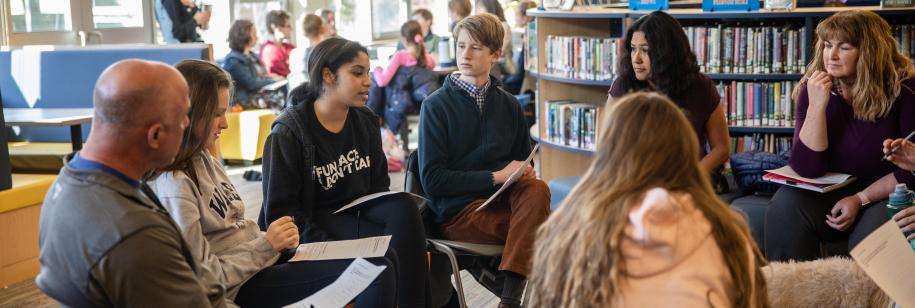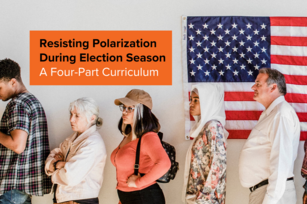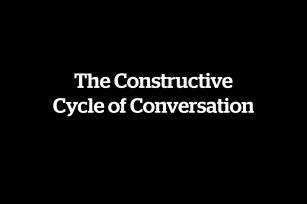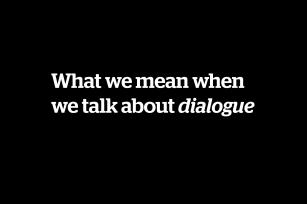
Breadcrumb
- Essential Partners
- Who We Work With
- Middle & High Schools
- Diversity Initiatives
Intellectual and Cultural Diversity
In an increasingly diverse, interconnected world, creating a genuinely inclusive environment can be a school’s stickiest and most challenging dilemma.
Our work is an integral part of larger diversity, equity, and inclusion educational efforts, especially when it is paired with something like implicit bias training. Content training is crucial, but oftentimes, after a DEI training, community members report lacking the practical tools and design skills to actually change the culture.
We offer a skills-based model to create a more inclusive, equitable school culture. By training educators, staff, and students in our approach, we empower your community to hold thoughtful, open-hearted conversations about their different identities. Our dialogue framework disrupts the established patterns of speech and action. It is a crucial tool to intentionally, cooperatively, and thoughtfully transform your school culture.
Our approach helps you create a space that genuinely and fully includes all voices, one that lets people build relationships of trust across differences of identities and values.

“Essential Partners gave us tools to talk about race in a way that’s brave and authentic.”
Osamagbe Osagie, Director of Equity and Inclusion
The Carroll School (MA)
Here’s what a culture-change collaboration with Essential Partners might look like as part of a diversity, equity, and inclusion initiative:
- Preparation / Through interviews, focus groups, and surveys, working with a planning team from across the institution, we map the sticky areas for your institution as well as short-term and long-term goals
- Skill-Building / We lead online or in-person workshops to train the key stakeholders—teachers, administrators, students, parents, etc.—so they can facilitate (and participate in) conversations that foster trust, understanding, and new relationships across differences
- Program Design / We co-design engagements that begin to shift the stuck patterns and cycles in your community, inviting more voices, creating more inclusive systems, building on foundation of trust
- Sustainability / We provide a smaller set of stakeholders with additional training, so they are able to design future engagements and incorporate our tools into the structure of meetings and decision-making processes, making the project sustainable.
- Community of Practice / All EP training participants become lifetime members of our global Community of Practice, with access to a monthly open house, exclusive resources, as well as skill-building and peer learning opportunities
- Continuing Support / Your school community will have access to support as you independently design and lead these initiatives on your own
Following a collaboration with Essential Partners, our clients and trainees continue to receive support in the form of consultation, coaching, office hours, exclusive resources, skill-building webinars, and peer learning opportunities.
Recently, we have trained teachers and administrators to hold inclusive conversations about the school’s internal culture, curriculum, and policies. We have equipped teachers to hold transformative classroom conversations about thorny course content, such as the Civil War, the role of guns, women’s rights, and indigenous history.
Students trained in dialogue facilitation have led conversations with their peers about issues related to diversity, equity, and inclusion as well. At Cary Academy (NC), students facilitated peer conversations about race with BIPOC, all-white, and interracial groups. Students at Bishop Lynch High School (TX) recently led peer small-group dialogues at a regional diversity conference.
“It’s critical that all of our students, faculty, and staff, feel that their voices are heard loud and clear, so, at the end of the day, we can find common ground,” said Danielle Johnson-Webb, Director of Equity and Community Engagement at Cary Academy. “So that we can say ‘We may come from different backgrounds, have different perspectives, or different opinions, but we still care about the same things. We still share concerns. We still value and respect each other as community members despite our differences and can learn from each other because of them.’”
Our work makes it possible for you to have vital conversations about your current school culture, the visible and hidden challenges, and your hopes for the future—together, as a community. Not only will you be able to understand the problems, you’ll also have the tools to enact change.
When you're ready to take steps to transform your school, reach out for a free consultation.


